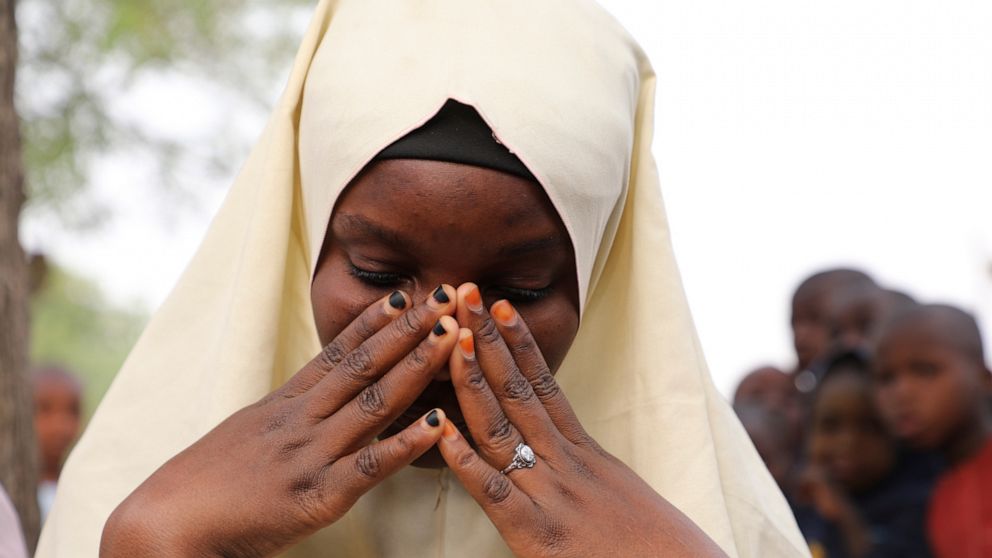LAGOS, Nigeria – Armed men kidnapped 317 girls from a boarding school in northern Nigeria on Friday, police said, the latest in a series of mass kidnappings of students in the West African country.
Police and military began joint operations to rescue the girls after the attack at the Government Junior High School for Girls in the city of Jangebe, according to police spokesman in Zamfara state, Mohammed Shehu, who confirmed the kidnapped number .
One father, Nasiru Abdullahi, told the Associated Press that his daughters, aged 10 and 13, are among the missing.
“It is disappointing that, although the military has a strong presence near the school, they have not been able to protect the girls,” he said. “At this stage, we expect only divine intervention.”
Resident Musa Mustapha said the armed men also attacked a nearby military camp and checkpoint, preventing soldiers from interfering while the armed men spent several hours at school. It was not immediately clear whether there were any casualties.
Several large groups of armed men operate in the state of Zamfara, described by the government as bandits, and are known for kidnapping for money and pushing for the release of their members from prison.
Nigerian President Muhammadu Buhari said on Friday that the government’s main objective is to make sure all the hostages at the school are returned safely, alive and unharmed.
“We are not going to succumb to the blackmail of bandits and criminals who target innocent students in the expectation of huge ransom payments,” he said. “May bandits, kidnappers and terrorists not have the illusion that they are more powerful than the government. They must not confuse our restriction with the humanitarian goals of protecting innocent lives as a weakness or a sign of fear or indecision ”.
He asked state governments to revise their policy of making payments, in cash or vehicles, to bandits.
“Such a policy has the potential to backfire with disastrous consequences,” said Buhari. He also said that state and local governments should do their part, being proactive in improving safety within and around schools.
UN Secretary-General Antonio Guterres strongly condemned the kidnappings and called for the “immediate and unconditional release” of the girls and the safe return of their families, calling the attacks on schools a serious violation of human and children’s rights, said the UN spokesman Stephane Dujarric.
The UN chief reaffirmed the UN’s support for the government and people of Nigeria “in their fight against terrorism, violent extremism and organized crime,” said Dujarric, and urged the Nigerian authorities “to spare no effort to bring those responsible for this crime to justice. “
“We are angry and saddened by yet another brutal attack on school children in Nigeria,” said Peter Hawkins, UNICEF representative in the country. “This is a gross violation of the rights of the child and a horrible experience for children to have.” He asked for his immediate release.
Nigeria has witnessed several attacks and kidnappings over the years, notably the mass kidnapping in April 2014 by the jihadist group Boko Haram of 276 high school girls in Chibok, in the state of Borno. Over a hundred girls are still missing.
Friday’s attack came less than two weeks after snipers kidnapped 42 people, including 27 students, from Government Science College Kagara in the state of Niger. Students, teachers and family members remain in detention.
In December, 344 students were kidnapped from the Kankara Government Secondary School of Science in the state of Katsina. They were finally released.
Anietie Ewang, a Nigeria researcher at Human Rights Watch, noted the recent kidnappings and tweeted that “Strong action by the authorities is needed to turn the tide and keep schools safe.”
Amnesty International also condemned the “terrible attack”, warning in a statement that “abducted girls are at serious risk of being injured”.
Teachers were forced to flee to other states in search of protection and many children had to drop out of school amid frequent violent attacks on communities, Amnesty said.
———
AP writer Carley Petesch in Dakar, Senegal contributed to this report.
